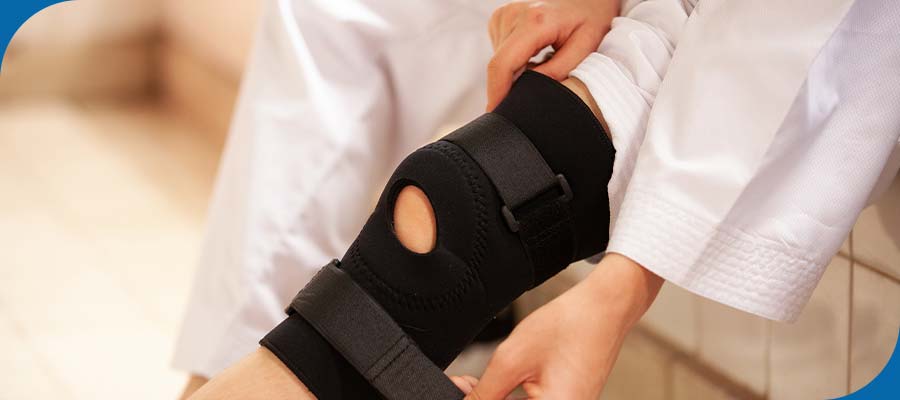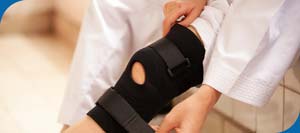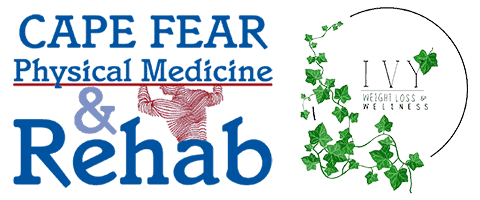Prosthetic Evaluation and Management in Fayetteville, NC
Prosthetic evaluation and management are essential for individuals seeking to regain function and mobility after limb loss. At Cape Fear Physical Medicine and Rehab, our professional team offers comprehensive evaluations to determine the best prosthetic solutions tailored to each patient’s needs. We provide ongoing support throughout the rehabilitation process, ensuring that patients achieve the highest quality of life possible. Contact us today for more information, or simply schedule an appointment online! We are conveniently located at 1540 Purdue Dr, Ste. 200, in Fayetteville, NC 28303.


Table of Contents:
What is involved in a prosthetic evaluation?
How do I know if I am a candidate for a prosthetic?
How long does a prosthetic evaluation take?
How often do I need follow-up appointments for prosthetic management?
At Cape Fear Physical Medicine and Rehab, our comprehensive prosthetic evaluation is tailored to help patients achieve optimal mobility, independence, and quality of life. Our dedicated team collaborates closely to determine your individual prosthetic needs and find the best solution for your lifestyle and personal goals.
A prosthetic evaluation is a comprehensive process designed to determine the most suitable prosthetic device and rehabilitation plan for an individual who has experienced limb loss. It typically begins with a thorough medical evaluation by a prosthetist or orthopedic surgeon, assessing the patient’s overall health, the specific circumstances of the limb loss, and any underlying medical conditions that could impact prosthetic use. This is followed by a detailed physical assessment, evaluating factors such as muscle strength, range of motion, and the condition of the residual limb to determine the feasibility of prosthetic fitting and the type of device that best suits their physical capabilities.
Beyond the physical aspects, the evaluation also delves into the individual’s lifestyle, vocational demands, and personal goals. The prosthetist will discuss their desired activities, daily routines, and expectations for the prosthesis. This information, combined with an assessment of their rehabilitation potential, helps in selecting the appropriate prosthetic components and customizing the device to optimize comfort and functionality. The overall aim is to create a personalized treatment plan that not only addresses physical needs but also supports the individual in achieving their desired level of independence and quality of life.
At Cape Fear Physical Medicine and Rehab, your comfort, preferences, and functional goals are always at the heart of our decision-making process. Our ultimate goal is to empower each patient with the support needed to achieve maximum comfort, mobility, independence, and an improved quality of life through successful prosthetic use.
Determining if you are a suitable candidate for prosthetic care involves a comprehensive evaluation by the experienced healthcare team at Cape Fear Physical Medicine and Rehab. Our professionals work collaboratively to create an individualized care plan tailored specifically to your needs.
To determine if you’re a candidate for a prosthetic, several factors need to be considered, including the overall health of your residual limb and your ability to tolerate a prosthetic device. The first step is a medical evaluation, which includes assessing the condition of your limb, healing progress after amputation, and any other underlying health issues that might affect the use of a prosthetic. Your doctor will examine whether your body is physically ready for a prosthetic and if it will fit comfortably and function as needed.
Your commitment to the rehabilitation process is another crucial factor. Using a prosthetic involves physical therapy to help you build strength, improve mobility, and adjust to the new device. Additionally, it’s important to consider your lifestyle and goals. Whether you’re looking to return to daily activities, sports, or work, a prosthetist will help determine if a prosthetic can meet those needs and provide the support you require.
If you or a loved one is considering prosthetic care, our experienced team at Cape Fear Physical Medicine and Rehab is here to help you navigate the process, evaluate your candidacy, and empower you to achieve your fullest potential.
A prosthetic evaluation typically takes about one to two hours, depending on the complexity of the patient’s condition and the type of prosthetic being considered. During this evaluation, a prosthetist will conduct a thorough assessment of your residual limb, including its size, shape, and overall health. They will also take detailed measurements and discuss your medical history to ensure that the prosthetic will be suitable for your needs. This process helps determine the right type of prosthetic device, as well as the fit and function and may involve some preliminary discussions about your goals and expectations for mobility.
Following the initial assessment, the prosthetist may need additional time to discuss options, explain the fitting process, and potentially order custom prosthetic parts. In some cases, a follow-up appointment may be scheduled to finalize the fitting or make adjustments based on your feedback. The time required for the entire process can vary, but the initial evaluation is essential for tailoring the prosthetic to your unique needs and ensuring a good fit.
At Cape Fear Physical Medicine and Rehab, our goal is to ensure every prosthetic device we provide is comfortable, highly functional, and carefully tailored to support each patient’s personal goals and active lifestyle.
At Cape Fear Physical Medicine and Rehab, we understand that personalized prosthetic care is essential to maximizing your mobility, comfort, and overall quality of life. Follow-up appointments for prosthetic management are typically scheduled every 3 to 6 months, depending on the type of prosthesis and the individual’s specific needs. These visits are essential for assessing the fit and function of the prosthesis, ensuring that it is comfortable and working effectively. Over time, as the residual limb may change due to weight fluctuations or muscle atrophy, adjustments to the prosthetic device may be necessary. Regular follow-ups help identify and address any issues before they become more significant problems.
In some cases, more frequent follow-ups may be required in the early stages after receiving a prosthesis, particularly if adjustments are needed to improve comfort or function. Additionally, follow-up appointments offer an opportunity to assess the individual’s overall health, check for skin irritation or breakdown, and monitor how well the prosthesis is supporting the person’s mobility. Your prosthetist will work with you to develop a follow-up schedule that best supports your unique needs and lifestyle.
If you notice changes in your weight, or activity levels, or experience other health issues, our team may suggest more frequent appointments. This ensures your prosthesis stays comfortable and works properly to support your movement and well-being. Contact us today for more information, or simply schedule an appointment online! We are conveniently located at 1540 Purdue Dr, Ste. 200, in Fayetteville, NC 28303. We serve patients from Fayetteville NC, Woodfield NC, Hope Mills NC, Fort Bragg NC, Eastover NC, and surrounding areas.

Check Out Our 5 Star Reviews


Additional Services You May Like
▸ Weight Loss & Wellness Program
▸ Botox for Migraine
▸ EMG Nerve Conduction Studies
▸ Epidural Steroid Injections
▸ Radiofrequency Ablation
▸ Rehabilitation Consultations
▸ Facet Injections
▸ Sacroiliac Joint Injections
▸ Joint Injections
▸ Genicular Nerve Blocks
▸ Prosthetic Evaluation/Management
▸ Adjuvant Therapy/Care
▸ Spasticity Management
▸ Stroke Treatment
▸ Multiple Sclerosis
▸ Spinal Cord Injury
▸ Traumatic Brain Injury
▸ Lifestyle Medicine
▸ Phentermine
▸ Qsymia
▸ Contrave

Additional Services You May Like
▸ Weight Loss & Wellness Program
▸ Botox for Migraine
▸ EMG Nerve Conduction Studies
▸ Epidural Steroid Injections
▸ Radiofrequency Ablation
▸ Rehabilitation Consultations
▸ Facet Injections
▸ Sacroiliac Joint Injections
▸ Joint Injections
▸ Genicular Nerve Blocks
▸ Prosthetic Evaluation/Management
▸ Adjuvant Therapy/Care
▸ Spasticity Management
▸ Stroke Treatment
▸ Multiple Sclerosis
▸ Spinal Cord Injury
▸ Traumatic Brain Injury
▸ Lifestyle Medicine
▸ Phentermine
▸ Qsymia
▸ Contrave







